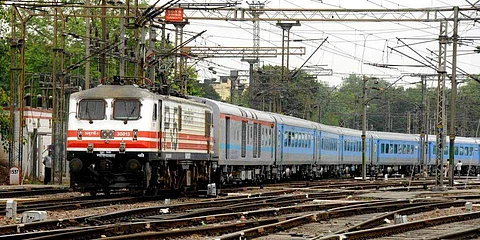

The railways' use of bio-toilets in its coaches will now be part of management school classrooms as a case study on its development and installation has been approved by the national transporter to be used as study material, according to a document accessed by PTI.
According to the document, the railways has given its nod to Indian School of Business (ISB) to use the study by them on the IR bio-toilets as curriculum for business schools.
"Based on our review of the attached case and other associated material, we hereby confirm that the Indian School of Business has the authority to use the case study and to authorize other educational institutions or organizations to use the case study. Wefurther approve the use of our images and logos as displayed within the case," the approval letter from the railways said.
Senior officials involved in the process confirmed that the use of bio-toilets, the technology developed with DRDO and the association with private entities to install them in the coaches of IR was an achievement, accomplished over a decade was ready material for management schools to learn about coordination between different departments and also a lesson in sustainability.
"There are two major takeaways from the bio-toilet project. One is that it's environment- friendly and their installation has resulted in cleaner stations and rails. Thesecond is that due to the use of bio-toilets, the corrosion in rails has reduced and will eventually lead to extending the life of the rails. We have signed an MOU with ISB and based on that they can also take it to other management schools," said a senior official.
He also said that the bio-toilet model was perfect for management schools as it highlighted the development of sustainable technology and how the national transporter has managed to go big with the concept.
"We have taken this on the largest scale possible and perhaps nowhere in the world has this been used at such a large scale," the official said.
The study, which will be part of business school curriculum, mentions how in 2011 the first prototype train with bio-toilets started from Gwalior and how the project was scaled up by 2014.
In less than ten years (between 2011 and 2020), 245,775 bio-toilets were installed in 68,694 coaches.
Tata Energy Research Institute (TERI) studied the impact of bio-toilets' fitment and found that with bio-toilets' adoption, the burden of cleaning the tracks and subsequent manual scavenging was eliminated.
The study said that this, in turn, improved the respect for labor, and the alternate jobs that manual scavengers were provided improved their livelihood.
This resulted in saving 5.4 million litres of water per day spent earlier on track washing at the train stations, the study said.
TERI estimated that this energy-saving benefit was of the order of reduction of carbon dioxide equivalent of 155 tonnes per annum.
"The bio-toilets initiative served as a source of open innovation. lt significantly expanded the markets to produce and sell bio-toilets to improve small and medium enterprises segment. The successful implementation of bio-toilets in the passenger trains demonstrated a critical message that while technical innovation is essential, its solution must be grounded in reality. That capability to carry out innovations in an evolutionary mode is -necessary to bring a change al the grass-root level. To make a fundamental social impact, considering the socio-economic factors becomes essential," the study says.
